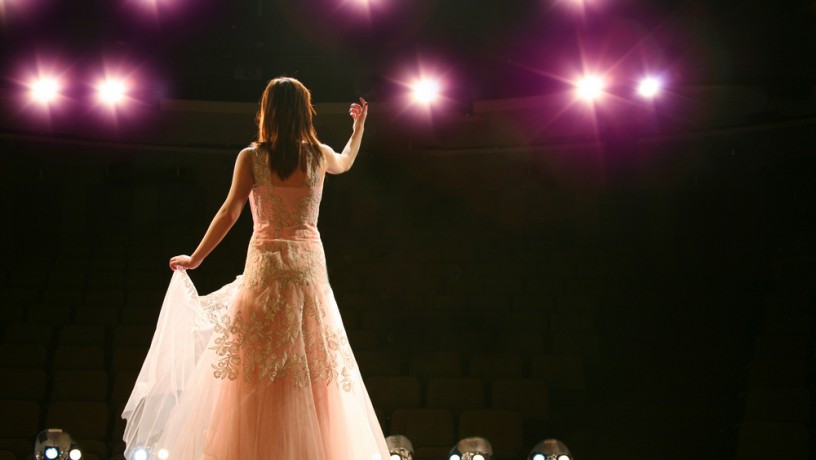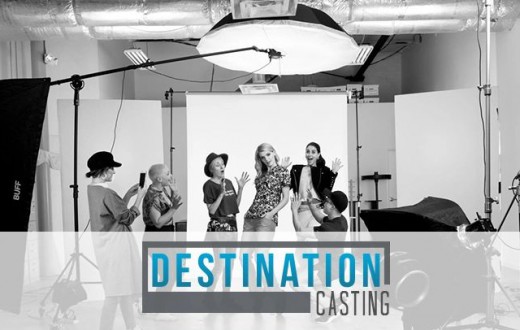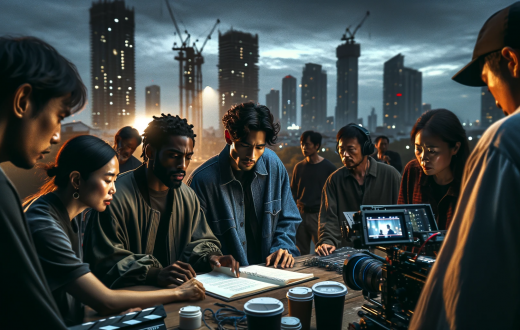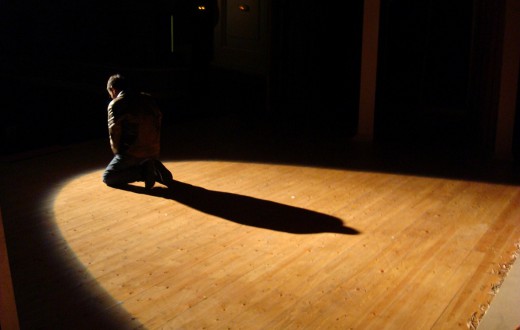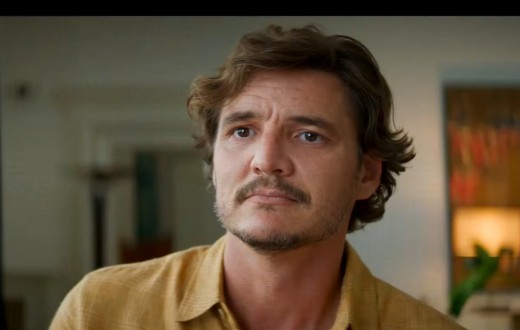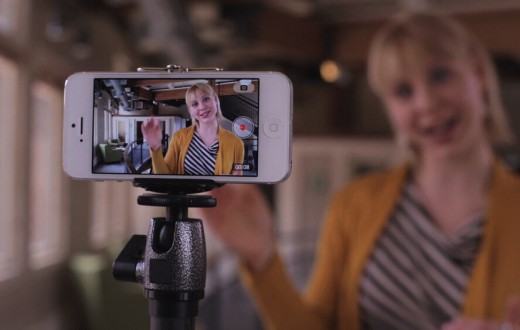Acting coach Joseph Pearlman speaks with a tremendous positive energy and enthusiasm that’s downright infectious. But it’s the information he imparts to the actors he’s working with that’s the real gift he offers. Pearlman’s message is all about empowerment: helping actors to not only see the greatness that already lies within themselves, but also to help them open their minds to another way to achieve success outside of the Matrix-like rules the system uses to entrap the thinking of actors.
Pearlman is a native of Boston who went to NYU and then a program at the Royal Academy of Dramatic Arts, after which he worked in regional theater in New England before moving to Park Slope and forming his own theater company. He subsequently moved out to Los Angeles, and after a revelatory year training with – and ultimately teaching with – legendary actor and teacher Jeff Corey (“Butch Cassidy and the Sundance Kid,” “True Grit”) Pearlman decided that helping other actors find their own revelations and breakthroughs was what truly motivated him.
At his Pearlman Acting Academy he’s worked with talents like Zooey Deschanel, Julian Sands, and Eugene Simon (“Game of Thrones,”). He was also named one of the “Top Ten Acting Gurus” on the app Acting Genie. He took a few moments to chat via Skype from his offices in Los Angeles.
So where did your love for acting and actors get started?
I’ve always done plays and acted since I can remember. I went to one of those all-boys, New England type of prep schools that was very jock-oriented, so my escape from all that was doing plays at the all-girls school where my sisters were. So there was definitely an ulterior motive: I was going there to hang out with girls, but there happened to be theater. I went to New York University, and studied there, and I was lucky enough to get into this incredible program at the Royal Academy of Dramatic Arts where I spent part of my last year at NYU. And all along – I didn’t call it coaching – but I was helping actors with their performances. I somehow had a knack for helping them get from point A to point B. I moved out to LA around 2004 and I was hired at a really cool acting studio to teach my own class, where I worked with a young Zooey Deschanel, and a young Ryan Reynolds, and a young Amy Adams, all these incredible actors before they broke out. And ultimately the studio – the woman who ran it was very sweet – but the process was just something I couldn’t get on board with. So I started my own studio and a lot of the folks came with me. And over the years, with word of mouth and helping actors get results outside the classroom, it just started to build from there.
Did you have any coaches yourself who inspired you?
I am fortunate to have had a mentor named Jeff Corey. He was probably in over 200 films in his career. He was blacklisted in the McCarthy era and started teaching acting above his garage. He taught a young Jack Nicholson, a young Stephen Spielberg, a young James Dean. I trained with him in the early 2000s. One of his core philosophies – and Jack Nicholson talks about this – is that nine-tenths of the performance is the personality of the actor. That doesn’t mean you’re playing yourself – it means you’ve got to [realize] 75 percent of every role you have in common with [the character.] We’re all human animals, we can relate and identify with a lot of stuff even if it’s outside of our realm of experience. And that’s just stuff you can wipe off your deck. You don’t have to act it. I think the really special experience that sparked all of this was working with Corey and being in that environment, seeing actors like Sean Penn come in and work in a small group. It was the first time I’d ever seen someone help an actor have a transformation every single time they got up. Guaranteed. It blew me away, and it was like, ‘This is what I want to do.’
So tell us a little about your philosophy toward coaching actors.
Actors need more information. They need to be empowered, and they need to have a lot of stuff taken off their plate that’s put there by fear, uncertainty and doubt, and that’s put there by people telling them, ‘This is how you’re supposed to do it.’ I definitely have a lot of fun empowering them in that way, and kind of giving them permission to break the rules in a way. Because everything is changing, even in the last year, everything is constantly in flux. In terms of the lay of the land this year, you can’t just be good, you have to be great. And when you’re great, there are no rules. There’s no ‘wash-rinse-repeat’ cycle. Most actors think they just need to get an agent, and then they wait for that agent to get them auditions, and that is very far from what happens.
What direction do you see things going in?
The other thing actors don’t realize is that the casting directors don’t cast them, ultimately. They’re a major part of the process, but it’s the writer, director and producer. And what’s happening is that this has been one of the slowest years for casting directors as a whole, because production has taken a lot of what casting has done, which is they’ve automated it so much. Production companies are saying, ‘Well if they can do that, why are we paying them when we can do that too?’ So what I’m doing is orienting the people that I work with to build game-changing relationships with the writers, producers and directors of the projects that they want to be a part of, long-game relationships, and from those they’re getting early access to sides, early access to scripts before they ever even hit casting. They’re able to get general meetings with production companies. So a lot of castings for my clients have come without ever setting foot in a casting office.
I’m sure most actors would love it if they could bypass casting and get hired straightaway!
It’s definitely an exciting thing, not because we don’t like casting directors, but there’s a lot of snakes and eels surrounding those offices, and it’s very hard for actors to penetrate that. And I’m happy for actors who don’t have to give their power away by going to some of these workshops that have been exploitative. I have a client that booked the lead in Ridley Scott’s new movie – I’m talking the lead in the movie – just by building a relationship with Ridley Scott’s production company, getting early access to a script, sending tape after tape in, and never seeing the inside of a casting office.
How does that work exactly?
What needs to happen in order to start building these relationships is actors need to know how they are going to sell themselves once they pick up a telephone or how they’re going to empower their rep who knows how to pick up a telephone to sell them. This is not the typical stuff you see in these branding workshops around town, it’s not your ‘acting niche’ or your ‘acting type.’ It’s more closely related to what’s taught at Harvard Business School, which is ‘value proposition.’ What that is is basically a brief statement that describes what’s awesome about you, and the number one reason why somebody should hire you. It’s something that they can’t ignore. We go through about 100 questions and we start putting together this power statement, this two-sentence statement that we’re able to sort of part out and use for every pitch we make.
And how has this approach been working out in the real world?
The long and the short of it, we’ve had 18 actors booking series and film leads in a single year without the help of a rep, most of the time outside of the traditional casting experience, by building game-changing relationships with writers, producers and directors in 3 to 60 seconds on the phone, and then maintaining it throughout the year. It’s badass, it’s empowering, and the actors are no longer just waiting and waiting and waiting. They’re not beholden to a casting director as this sort of gatekeeper to you being seen by the people who are actually going to hire you. And they’re getting hard results.
So how does the actor get to this point where they can take this approach?
The best advice is to be great. Devote yourself to being the best actor you can be. Stop obsessing about reps, stop looking for reps, don’t worry about pictures, don’t worry about your resume. Just devote yourself to being so great they can’t ignore you. The other thing too is that great actors know the work was great not because they watch the playback in some acting class, it’s because they feel it. What you’re watching on camera is the result of this whole chemistry experiment. You can’t go looking for that on video. I encourage actors to know that the work was great on their own. The number one thing that’s happening is they’re having fun. If you’re not having fun, it’s not working. Period.
Okay. But in the meantime, let’s assume most of us will still be auditioning. What’s some advice?
The number one audition rule is don’t guess what you think someone is looking for. Don’t try to please the casting director. Assume you are who they’re looking for and bring yourself to the piece with a phenomenally brave and fun choice. Because they don’t know what they’re looking for. They’re looking for a solution to the problem. And no one likes somebody who’s trying to please them. It’s nice when somebody is like, ‘Hey here’s a solution to the problem. I hope you guys are having a great day. I’ve got to go somewhere else right now, but I look forward to hopefully working with you guys,’ and then leaves.
And are there any common mistakes you could point out that lots of actors make?
Here’s one big thing: actors think that it’s their job to obey, both emotionally and technically, the stage directions and the character description. They think those are their acting instructions. And what’s crazy about that is, that stuff for the most part is written by a casting director, and not the production company. What it’s for is that it tells the actor about the world they’re in. What I tell actors is don’t obey the character description, because you can be sure every other actor is going to be doing that.
Anything else?
Another thing is a lot of actors think they have to bring their training into the actual acting. So one of the hardest things for an actor to do is let go. If you have done great work, if your work has been strong medicine in your body, it’s like a properly packed parachute that prevents a skydiver from falling to his death. If you’ve done your work properly, all you need to do is jump out of that plane and pull the ripcord and let that parachute gently guide you down. What I always tell actors is: what if your best acting self is just as easy and loose as if you were playing yourself? Would you feel you were interesting enough? I’m not telling them what if your best acting is you playing yourself. I’m saying it should feel easy and loose and effortless. A lot of actors don’t trust that. They want every moment to feel as though they’re birthing a calf.
Any final thoughts?
The real joy in my life is how do you prepare a piece to guarantee an audition with it so that you book a role, you get a callback, and somebody falls in love with your acting. That’s my real joy, is helping actors do that. Because once you create an opportunity for yourself, you’ve got to be amazing.

